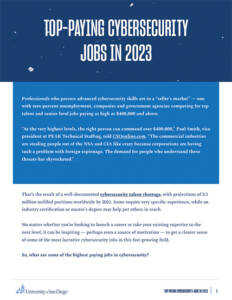How secure is your business or organization’s technology? What areas need to be strengthened? What risks are you facing every day? These are extremely important questions, and ones that security consultants strive to answer as they fight on the front lines against all types of security threats.
In this blog post, we’ll cover everything related to this important cybersecurity position, including typical job responsibilities, career path, average salary, companies that are hiring for this type of work and much more.
What is a Security Consultant & Why Is This Position Important?
First, let’s talk about the responsibilities of a security consultant. This person is typically someone who assesses the security and risk of a business or organization and ultimately provides solutions and recommendations on security measures and protection. In doing so, they are essentially a hacker — but they’re on the good team.
“Cybersecurity consultants are hackers — not malicious hackers, but hackers in the true sense of the word; people who are inquisitive and learn how to solve problems using technology,” according to Cybersecurity Guide.
There is a great need for security consultants. Cyberattacks have increased 50% from 2021 to 2022 and are expected to continue to rise. Experts predict that a ransomware attack will occur about every 11 seconds in 2022.
The FBI’s list of security threats involves the following:
- Phishing attempts — The use of “spoofing techniques” to trick you into providing information to people who shouldn’t have it
- Vishing — Similar to phishing attempts, these scams happen over the phone
- Smishing — These threats take place through text messages
- Pharming — This refers to when a malicious code is installed on your computer, and you’re redirected to websites that are not real
A security consultant needs to stay on top of trends and adapt to new methods and techniques. For example, the top cybersecurity threats in 2021 included:
- More sophisticated phishing
- Evolving ransomware strategies
- Cryptojacking
- Cyber-physical attacks
- State-sponsored attacks
- IoT attacks
- Threats against smart medical devices and electronic medical records
- Heightened risk related to granting system access to third parties (vendors, contractors and partners)
- Vulnerabilities with connected cars and semi-autonomous vehicles
A security or cybersecurity consultant could work directly for an organization, or, as the name suggests, work for client organizations that provide consulting services. If the latter is the case, the person must be able to adapt to working within specific industries, such as banking, retail, healthcare, hospitality, etc. The end goal? Come up with emergency plans and security measures for their clients.
The cost of cybercrime is estimated to be around $10.5 trillion by 2025. From small and medium businesses to large enterprises, businesses across a variety of industries are being targeted. Security consultants are an integral part of protecting businesses against cybercrime.
Job Duties & Responsibilities for a Security Consultant
The job duties and responsibilities of a security consultant will vary, depending on experience level, industry and other factors. Common duties and responsibilities include, but aren’t limited to:
- Creating and maintaining safety protocols, systems and plans to cover security threats
- Identifying potential security threats
- Overseeing a team of security specialists
- Constantly running risk assessment tests to determine and eliminate vulnerabilities in the system
- Training staff to recognize possible security breaches and risks
What Is a Normal Day for a Security Consultant?
It’s important to remember that the specific responsibilities of a security consultant will vary depending on the size and industry of the company or organization, but here’s a rundown of a typical “normal day” for this type of position.
A security consultant will likely have meetings weekly, if not daily, to discuss anything from current and potential security concerns to the implementation of new equipment, protocols or procedures.
One of the main responsibilities of a security consultant is to assess security risks and manage any attacks or issues as they arise. A consultant may check messages first thing in the morning to make sure there aren’t any pressing security concerns. Though this isn’t necessarily an “on-call” type of position, a consultant may be contacted after hours in the event of an emergency.
Other daily responsibilities may include creating technical reports, providing suggestions and guidance to IT teams and being involved in any type of security training opportunities and education.
How to Become a Security Consultant
An undergraduate degree in computer science, information security, cybersecurity, engineering or a related field is highly preferred for a security consultant.
In this field, a consultant may start as a junior member of an IT team and typically needs 1-3 years of experience before taking on more of a leadership role.
According to PayScale, most companies expect security consultants to have at least a bachelor’s degree and 3-5 years of professional experience.
Educational Requirements
As mentioned, an undergraduate degree in computer science, information security, cybersecurity or a related field is highly desirable for this type of position.
Advanced degrees are typically not required, but according to Cyberseek, 22% of online job listings for a cybersecurity consultant position request a graduate degree. An advanced degree can help you stand out against the competition, and in some cases, they may be preferred or required by certain employers. Consider obtaining an advanced degree in information technology, cybersecurity or computer science.
By prioritizing education, aspiring security consultants can build on experience and make important connections in order to achieve their career goals.
Security Consultant Certifications
Top certifications requested for cybersecurity consultants, according to Cyberseek, include:
- Certified Information Systems Security Professional (CISSP)
- Certified Information Systems Auditor (CISA)
- Certified Information Security Manager (CISM)
- Certified Information Privacy Professional (CIPP)
- SANS/Global Information Assurance Certification (GIAC)
- CompTIA Security+
Hard Skills Needed
If you’re considering a career as a security consultant, here are some hard skills that are often required for the position:
- Computer programming and coding
- Network and security configuration
- Courses in cloud computing infrastructure and services, computer programming in Java, network and security foundations and network and security applications
- Knowledge of encryption technologies
- Security incident handling and response
- Understanding of the latest threats, processes and strategies
Cyberseek also lists the following top skills needed for cybersecurity consultants:
- Information security
- Information systems
- Oracle
- Project management
- Asset protection
- Python
- Prevention of criminal activity
- Security operations
Soft Skills Needed
Hard skills may demonstrate your knowledge and experience, but soft skills are essential and can demonstrate your ability to work well with others and build successful relationships within a business or organization.
Cybersecurity Guide lists these soft skills needed for security consultants:
- Project lead experience
- Excellent documentation and organization skills
- Excellent oral, written and presentation skills
- The ability to communicate security-related concepts to a range of technical and non-technical audiences
Indeed’s list of top five soft skills include:
- Problem-solving
- Effective communication skills
- Self-direction
- Drive
- Adaptability
Indeed also mentions:
- Teamwork
- Leadership
- Creativity
- Strong work ethic
Security Consultant Salary
A security consultant salary will vary depending on a number of factors, including job responsibilities, type of company or organization, industry, your experience and geographic location. But according to Cyberseek, the average salary for this position is $87,735; PayScale cites salaries ranging from $61,000 to $135,000.
Examples of Companies Hiring Security Consultants
A recent search of security and cybersecurity consultant positions on LinkedIn revealed thousands of results. (You can see the complete list here.) Other job titles that you might see in your search include Cybersecurity Consultant, Security Specialist and Information Security Consultant/Analyst. Here’s a sampling of companies hiring for this type of position:
- Amazon and Amazon Web Services
- BlueCross BlueShield
- Microsoft
- Garmin
- Zoom
- Walt Disney Studios
- Booz Allen Hamilton
- Verizon
- IBM
- Accenture
- Experian
Security Consultant Career Outlook
In general, the demand for security and cybersecurity jobs remains high, with experts projecting 3.5 million unfilled cybersecurity jobs globally by 2021. The cybersecurity market is estimated to reach $372.04 billion by 2028.
The outlook for security consultants specifically is also especially positive, with Focal Point listing cybersecurity consultants as one of the five most in-demand cybersecurity jobs.
Advanced Educational Preparation for Security Consultants
This information is brought to you by the University of San Diego — a highly regarded industry thought leader and education provider that offers a 100% online Master of Science in Cyber Security Operations and Leadership. This degree program features a practical, cutting-edge curriculum taught by expert instructors who share insights drawn from highly relevant industry experience.
Frequently Asked Questions
What Are Some Other Top Cybersecurity Careers?
Cybersecurity is a fast-growing, high-paying field with a range of different types of job openings. Which role might be ideal for you? Take a moment to explore some of the other exciting careers in cybersecurity:
Chief Information Security Officer (CISO)
Want to see the top-paying jobs in cybersecurity? Read this article.
Want to see the top entry-level jobs in cybersecurity? Read this article.
Want to see the top non-technical jobs in cybersecurity? Read this article.
Want to learn how to land the best jobs in cybersecurity? Read this article.

![Preview image of How to Become a Security Consultant [Career Guide]](https://onlinedegrees.sandiego.edu/wp-content/uploads/2022/01/How-to-become-a-Security-Consultant.jpg)



